 AN OPEN LETTER FROM A WISCONSIN FARMER WHO REGRETS SIGNING A WIND CONTRACT
AN OPEN LETTER FROM A WISCONSIN FARMER WHO REGRETS SIGNING A WIND CONTRACT
"By signing that contract, I signed away the control of the family farm, and it's the biggest regret I have ever experienced and will ever experience."
-Gary Steinich, Cambria, Wisconsin. June 2011
Sometime in late 2001 or early 2002, a wind developer working for Florida Power and Light showed up near the Wisconsin Town of Cambria looking to get in touch with someone at the Steinich family farm.
He wanted to talk to the landowner about leasing a bit of land for the installation of a met tower. He needed to measure the winds in the area for a possible windfarm and Walter Steinich's land looked like a good place to do it.
The wind developer seemed like a good guy to Mr. Steinich who was in his early 70's at the time. The money seemed good. A met tower didn't seem like a big deal. It was just a tall pole with some guy wires, and it was temporary. Mr. Steinich signed the contract.
That was nearly ten years ago. Mr. Steinich has since passed away and now his son, Gary, runs the farm. He's written an open letter to Wisconsin farmers about his experience with the wind company since then.
Photos below are of access roads and turbine foundations in various farm fields in the Glacier Hils project now under construction in Columbia County, Wisconsin
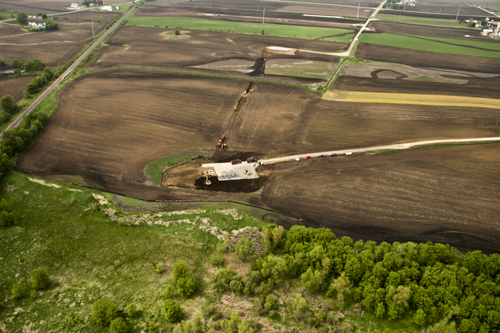 Turbine access road cutting diagonally across field in Glacier Hills project. May 2011
Turbine access road cutting diagonally across field in Glacier Hills project. May 2011
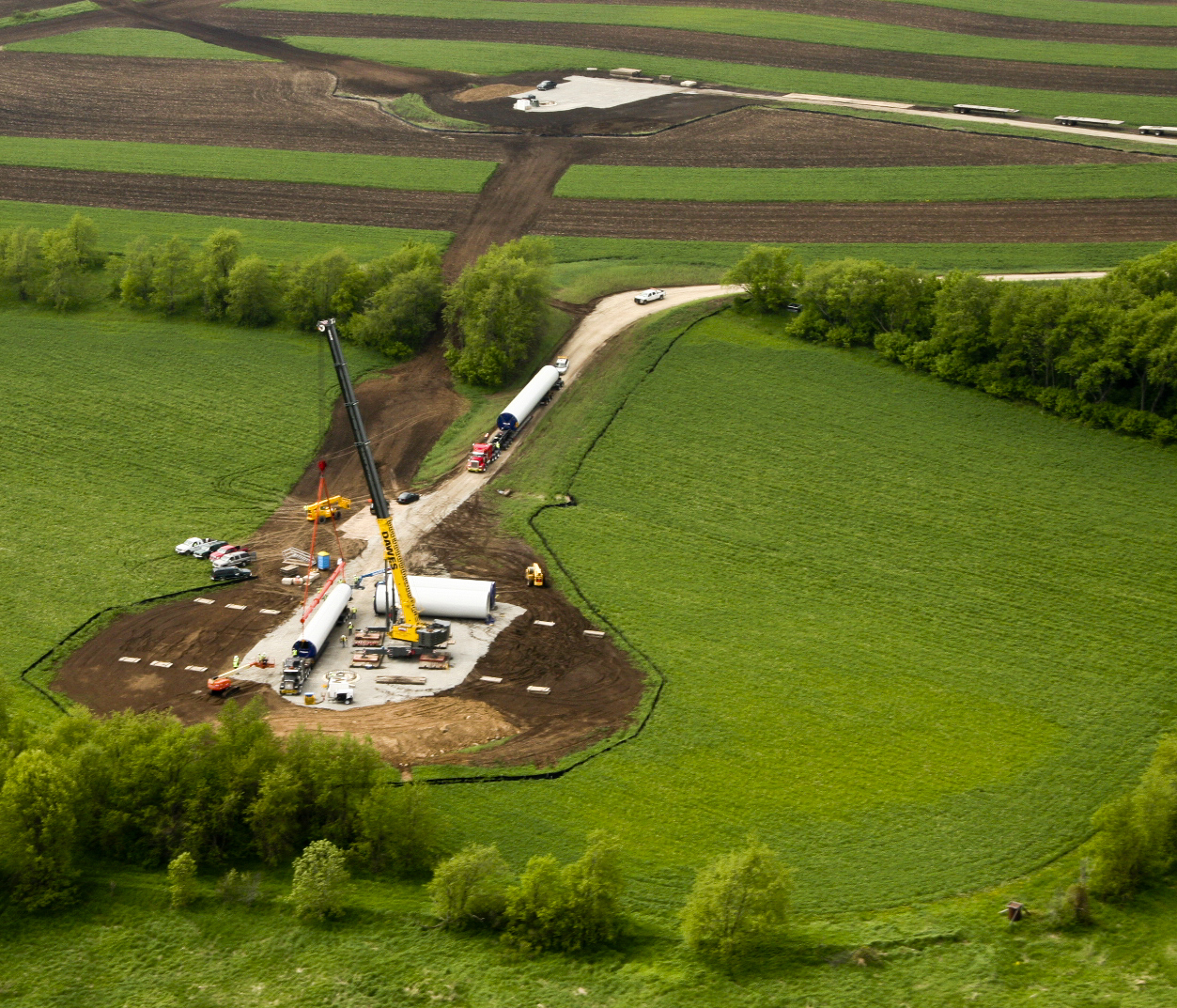
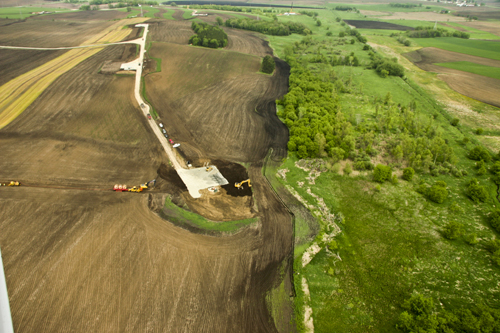
From One Wisconsin Farmer to Another:
This is an open letter to Wisconsin farmers who are considering signing a wind lease to host turbines on your land. Before you sign, I’d like to tell you about what happened to our family farm after we signed a contract with a wind developer.
In 2002, a wind developer approached my father about signing a lease agreement to place a MET tower on our land. My father was in his 70’s at the time. The developer did a good job of befriending him and gaining his trust.
He assured my father that the project wasn’t a done deal and was a long way off. They first had to put up the MET tower to measure the wind for awhile.
He told my father that if the project went forward there would be plenty of time to decide if we wanted to host turbines on our farm. There would be lots of details to work out and paperwork to sign well before the turbines would be built. The developer said my father could decide later on if he wanted to stay in the contract.
In 2003 the developer contacted us again. This time he wanted us to sign a contract to host turbines on our land. We were unsure about it, so we visited the closest wind project we knew of at the time. It was in Montfort, WI.
The Monfort project consists of 20 turbines that are about 300 feet tall and arranged in a straight line, taking up very little farmland with the turbine bases and access roads. The landowners seemed very satisfied with the turbines. But we were still unsure about making the commitment.
We were soon contacted again by the developer, and we told him we were undecided. Then he really started to put pressure on us to sign.
This was in March of 2004, a time of $1.60 corn and $1200 an acre land. It seemed worth it have to work around a couple of turbines for the extra cash. We were told the turbines would be in a straight line and only take up a little bit of land like the ones in Monfort.
And we were also told that we were the ones holding up the project. That all of our neighbors had signed, and we were the last hold-outs. It persuaded us.
What we didn’t know then was the developer was not being truthful. We were not the ‘last hold-out’ at all. In later discussions with our neighbors we found out that in fact we were the very first farmers to sign up. I have since found out this kind of falsehood is a common tactic of wind developers.
My father read through the contract. He said he thought it was ok. I briefly skimmed through it, found the language confusing, but trusted my father's judgment. We didn’t hire a lawyer to read it through with us. We didn’t feel the need to. The developer had explained what was in it.
The wind contract and easement on our farm was for 20 years. By then my dad was 75. He figured time was against him for dealing with this contract in the future so we agreed I should sign it. A few months later, my father died suddenly on Father's Day, June 20th, 2004
After that, we didn’t hear a whole lot about the wind farm for a couple years. There was talk that the project was dead. And then in 2007 we were told the developer sold the rights to the project. A Wisconsin utility bought it.
After that everything changed. The contract I signed had an option that allowed it to be extended for an additional 10 years. The utility used it.
The turbines planned for the project wouldn’t be like the ones in Monfort. They were going to be much larger, 400 feet tall. And there were going to be 90 of them.
They weren’t going to be in a straight row. They’d be sited in the spots the developer felt were best for his needs, including in middle of fields, with access roads sometimes cutting diagonally across good farm land. Landowners could have an opinion about turbine placement but they would not have final say as to where the turbines and access roads would be placed. It was all in the contract.
Nothing was the way we thought it was going to be. We didn't know how much land would be taken out of production by the access roads alone. And we didn't understand how much the wind company could do to our land because of what was in the contract..
In 2008 I had the first of many disputes with the utility, and soon realized that according to the contract I had little to no say about anything. This became painfully clear to me once the actual construction phase began in 2010 and the trucks and equipment came to our farm and started tearing up the field.
In October of 2010 a representative of the utility contacted me to ask if a pile of soil could be removed from my farm. It was near the base of one of the turbines they were putting on my land. I said no, that no soil is to be removed from my farm.
The rep said that the pile was actually my neighbor’s soil, that the company was storing it on my land with plans to move it to another property.
Shortly afterwards I noticed the pile of subsoil was gone.
In November of 2011 I saw several trucks loading up a second pile of soil on my land and watched them exiting down the road. I followed them and then called the Columbia County Sheriff. Reps from the company were called out. I wanted my soil back.
A few days later the rep admitted they couldn’t give it back to me because my soil was gone. It had been taken and already dispersed on someone else's land. I was offered 32 truck loads of soil from a stockpile they had. I was not guaranteed that the soil would be of the same quality and composition as the truck loads of soil they took from my farm.
I was informed by the lawyer for the utility that I had until April 30, 2011 to decide to take the soil. There would be no other offer. Take it or leave it.
I contacted the Public Service Commission for help. The PSC approved the terms of project and I believed the utility was violating those terms. The PSC responded by telling me they could do nothing because the issue involved a private contract between myself and the utility.
They told me my only option was to sue the utility.
My father and I both worked those fields. Watching the way they’ve been ripped apart would sicken any farmer. But what farmer has the time and money it would take to sue a Wisconsin utility?
By signing that contract I signed away the control of the family farm, and it’s the biggest regret I have ever experienced and will ever experience. I have only myself to blame for not paying close enough attention to what I was signing.
We had a peaceful community here before the developer showed up, but no more. Now it’s neighbor against neighbor, family members not speaking to one another and there is no ease in conversation like in the old days. Everyone is afraid to talk for fear the subject of the wind turbines will come up. The kind of life we enjoyed in our community is gone forever.
I spend a lot of sleepless nights wishing I could turn back the clock and apply what I've learned from this experience. Now corn and bean prices are up. The money from the turbines doesn't balance out our crop loss from land taken out of production. The kind of life we enjoyed on our family farm is gone forever too.
I would not sign that contract today. As I write this, the utility is putting up the towers all around us. In a few months the turbines will be turned on and we'll have noise and shadow flicker to deal with. If I have trouble with these things, too bad. I've signed away my right to complain. These are some of the many problems I knew nothing about when I signed onto the project.
If you are considering signing a wind lease, take the contract to a lawyer. Go over every detail. Find out exactly what can happen to your fields, find out all the developer will be allowed to do to your land. Go through that contract completely, and think hard before make your decision.
I can tell you from first hand experience, once you sign that contract, you will not have a chance to turn back.
Gary Steinich
Steinich Farms, Inc.
Cambria, WI
June, 2011
EXTRA CREDIT READING:
It can be found on the PSC Docket for the Glacier HIlls project. [ #6634 CE 302]
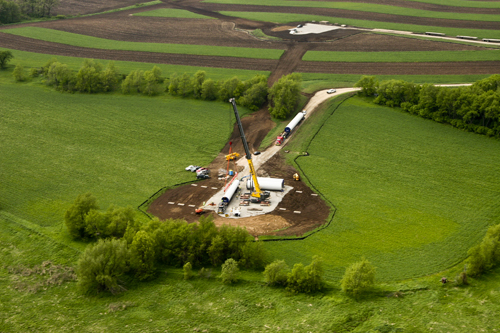
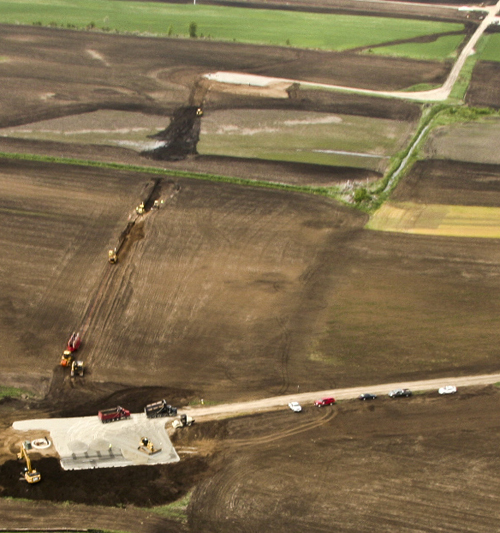
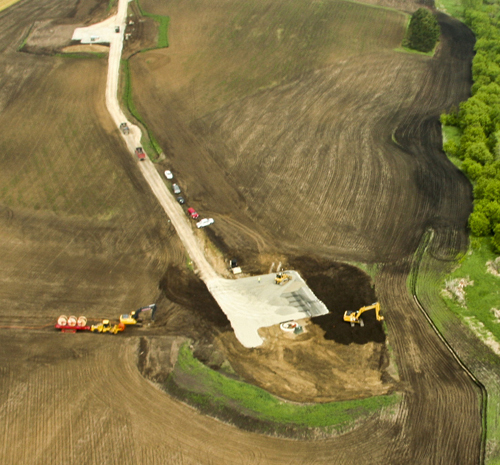
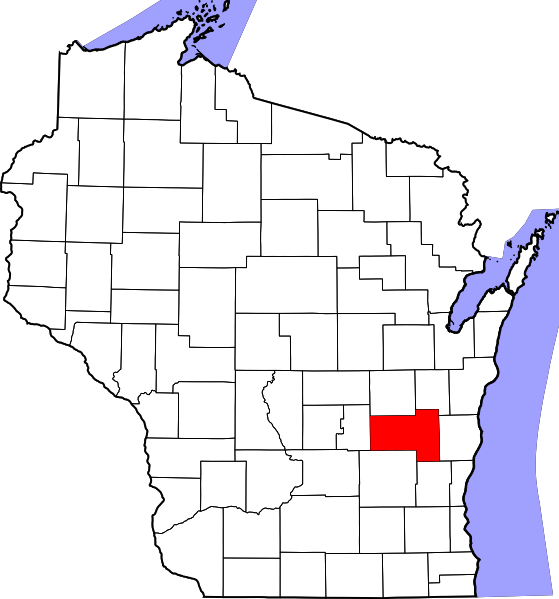 A Fond Du Lac Farmer has regrets about agreeing to host a wind turbine--
A Fond Du Lac Farmer has regrets about agreeing to host a wind turbine--
Why can't he speak openly about it?
When you sign a 20 to 30 year contract to host a wind turbine on your property you may be signing away many rights you're unaware of. A confidentiality agreement in the contract may mean legal action can be taken against you if you complain publicly about the project. A Fond Du Lac farmer signed away his rights. He was interviewed by Don Bangart who wrote the following on behalf of the farmer, whose contract with the wind company prevents him from speaking openly about any problems.
This was printed as a full page ad in the Chilton, Wisc., Times-Journal, October 25, 2007.
WHAT HAVE I DONE?
Now each morning when I awake, I pray and then ask myself, “What have I done?”
I am involved with the BlueSky/Greenfield wind turbine project in N.E. Fond du Lac County. I am also a successful farmer who cherishes his land. My father taught me how to farm, to be a steward of my fields, and by doing so, produce far better crop production. As I view this year’s crops, my eyes feast on a most bountiful supply of corn and soybeans. And then my eyes focus again on the trenches and road scars leading to the turbine foundations. What have I done?
In 2003, the wind energy company made their first contacts with us. A $2,000 “incentive” started the process of winning us over, a few of us at a time. The city salesmen would throw out their nets, like fishermen trawling for fish. Their incentive “gift” first lured some of us in. Then the salesmen would leave and let us talk with other farmers. When the corporate salesmen returned, there would be more of us ready to sign up; farmers had heard about the money to be made. Perhaps because we were successful farmers, we were the leaders and their best salesmen.
Sometime in 2004 or 2005, we signed $4,000 turbine contracts allowing them to “lease” our land for their needs. Our leases favored the company, but what did we know back then? Nobody knew what we were doing. Nobody realized all the changes that would occur, over which we would have no control. How often my friends and I have made that statement: What have I done?!
I watched stakes being driven in the fields and men using GPS monitors to place markers here and there. When the cats and graders started tearing 22-foot-wide roads into my fields, the physical changes started to impact not only me and my family, but, unfortunately, also my dear friends and neighbors. Later, a 4-foot-deep by 2-foot-wide trench was started diagonally across my field. A field already divided by their road was now being divided again by the cables running to a substation. It was now making one large field into 4 smaller irregularly shaped plots. Other turbine hosts also complained about their fields being subdivided or multiple cable trenches requiring more of their land. Roads were cut in using anywhere from 1,000 feet to over half a mile of land to connect the locations. We soon realized that the company places roads and trenches where they will benefit the company most, not the landowner. One neighbor’s access road is right next to some of his outbuildings. Another’s is right next to his fence line.
At a wind company dinner presented for the farmers hosting the turbines, we were repeatedly told — nicely and indirectly — to stay away from the company work sites once they start. I watched as my friends faces showed the same concern I had, but none of us spoke out. Months later, when I approached a crew putting in lines where they promised me they definitely would not go, a representative told me I could not be there. He insisted that I leave. The line went in. The company had the right. I had signed the lease.
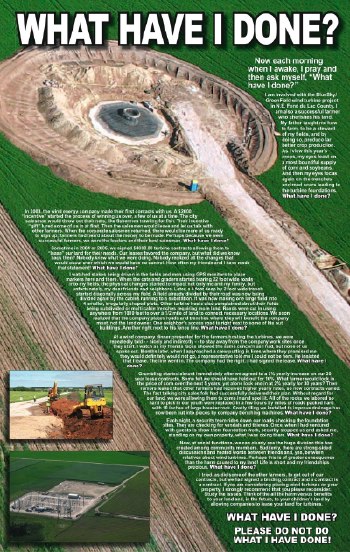 Grumbling started almost immediately after we agreed to 2% yearly increases on our 30-year lease contracts. Some felt we should have held out for 10%. What farmer would lock in the price of corn over the next 5 years, yet alone lock one in at 2% yearly for 30 years? Then rumors emerged that other farmers had received higher yearly rates, so now contracts varied. The fast-talking city sales folk had successfully delivered their plan. Without regard for our land, we were allowing them to come in and spoil it. All of the rocks we labored so hard to pick in our youth were replaced in a few hours by miles of roads packed hard with 10 inches of large breaker rock. Costly tiling that we installed to improve drainage had now been cut into pieces by company trenching machines.
Grumbling started almost immediately after we agreed to 2% yearly increases on our 30-year lease contracts. Some felt we should have held out for 10%. What farmer would lock in the price of corn over the next 5 years, yet alone lock one in at 2% yearly for 30 years? Then rumors emerged that other farmers had received higher yearly rates, so now contracts varied. The fast-talking city sales folk had successfully delivered their plan. Without regard for our land, we were allowing them to come in and spoil it. All of the rocks we labored so hard to pick in our youth were replaced in a few hours by miles of roads packed hard with 10 inches of large breaker rock. Costly tiling that we installed to improve drainage had now been cut into pieces by company trenching machines.
Each night, a security team rides down our roads checking the foundation sites. They are checking for vandals and thieves. Once, when I had ventured with guests to show them foundation work, security stopped us and asked me, standing on my own property, what I was doing there. What have I done?
Now, at social functions, we can clearly see the huge division this has created among community members. Suddenly, there are strong-sided discussions and heated words between friends and, yes, between relatives about wind turbines. Perhaps this is a greater consequence than the harm caused to my land — life is short, and friendships are precious.
I tried, as did some of the other farmers, to get out of our contracts, but we had signed a binding contract. If you are considering placing wind turbines on your property, I strongly recommend that you please reconsider. Study the issues. Think of all the harm to your land, and, in the future, to your children’s land, versus the benefits from allowing companies to lease your land for turbines.
WHAT HAVE I DONE?
PLEASE DO NOT DO WHAT I HAVE DONE!
The Ontario Federation of Agriculture offers these 30 suggestions for wind farm leases for farmers. Some of these are specific to Canada but they will give you an idea of the unexpected complications and the kinds of rights you may be signing away (click here to read it at its source)
From the ONTARIO FEDERATION of AGRICULTURE APRIL 2007
30 Suggestions on Wind Power Leases for Farmers
Ontario needs power and farmers need income. OFA favours wind power where generators do not harm
other things important to the community. If you sign a lease make sure it fits your plan for your farm.
1. Meet with your neighbours – Meet and work with your neighbours and OFA Services Rep.
2. Cost of a Lawyer - Ask the wind power company to pay to have the agreement reviewed by a
lawyer who will work for everyone in the area. This saves you $ 500 to $ 1,000.
3. Transferability - Add a clause that stipulates that the agreement cannot be transferred by the
wind company to any person or company without your approval.
4. Appearance – No leases address appearance, but you could have to look at it for 50 years.
Add a clause that prohibits advertising on the tower.
Add a clause that stipulates the paint colour be agreed and repainted if it becomes rusty.
Add a clause that covers effective reclamation of the site when all is done.
5. Building Restrictions – Attach a map of the property to the agreement that outlines areas
where new buildings over 20 metres can and cannot be built.
6. Fill Material - Under no circumstances should a developer use fill taken from your land.
7. Gear oil - You can use the lease to prohibit the use of toxic gear oil.
8. Option Termination - Add a clause that stipulates that the option ends at 5:00 p.m. on a
specific date if construction has not started by that date. You need a clear ending to the option.
9. Net Meter Tower - Ask the company to lend you its crane to install your own net metered
wind generator. You must be ready when they are, but it could save you $ 10,000.
10. Option - The minimum should be $ 5,000/ 100 acres for three to five years. No renewal; they
put up a wind tower or they are gone. No payment is enough to make a bad lease worthwhile.
11. Rent – Rent should be at 3% for the first eight years then go to 8% once bank loans etc. are
covered. Rent should apply to all income from the project including green house gas credits.
12. Insurance - Add a clause stipulating that the wind company must produce a valid certificate of
insurance covering liability to the farm and others each year and that it assumes full liability for
damage caused by the wind tower or the contractors or consultants etc..
13. Protect Capital Value - Add a clause requiring the wind power company to make whole any
losses in re-sale value that might occur as a result of the lease or a wind tower being in place. If
the wind tower effects your land value, losses might not be covered by rent.
14. 0ther Development – If the property may be valuable for other development in the next 30
years do not sign, you will be giving the wind company your future profits or capital gains.
15. Your Other Rights - Some leases have clauses that appropriate your development rights for
aggregates, ground water, top soil, sale outside of the family and even your right to speak in
public on wind power questions. Any such clause should be stricken from the agreement.
16. Tenants Rights - Stipulate that the only rights the tenant will have are the rights to do needed
studies, the rights to construct, operate and maintain no more than two wind towers per 100
acres as well as required roads and wires, and to remove the electricity from the site to the grid.
17. A Cooling Off Period – have a clause that states that either party may cancel the agreement
within 30 days without reason or penalty.
18. Power Sales - Stipulate that power must be sold to government or you get to approve any
other contract. Without this power can be sold to a subsidiary of the wind power company and
the 3% rent you were hoping for will 3% of very little.
19. Hours, Times of Access – Access for emergencies at any time. Other access between 8:00
a.m. and 5:00 p.m. Monday to Friday and requires notice so there is no interference with
seeding, harvests, calving, or other farm or family activities that are time restricted
20. Area of Lease - Limit the area covered by lease to a suitably small area – 1 to 5 acres
21. Applies to One Lot Only - Limit the agreement so it only applies to the actual lot leased and
that there is no reference to any other land owned by the farmer
22. Conversion to Easement – Do not allow a conversion to an easement as it will be more
difficult, perhaps impossible to discharge at the end.
23. Quitclaim – ensure the lease provides for a clean end so the wind company cannot be
released from the lease or recover funds from the escrow account without your approval and
certification that they have met all their obligations including clean up.
24. Wind Rights Only - Do not allow any clause that gives the wind power company a right of first
refusal or an option for any purpose other than the use of the wind. Such clauses encumber
sales, wills, development of other businesses etc.
25. Term of Lease – suggest 3 year option, 20 years for first term and 5 year renewals to follow.
This provides enough time to do tests and make profits and brings the replacement date for the
generator and the lease renewal dates closer together, which improves your negotiating position.
26. Assessment and Property Taxes – the land owner is ultimately responsible for taxes – a
clause to require the wind power company to pay taxes associated with the wind tower is
essential and it requires an enforcement clause – you cannot afford their taxes, unless you have
their income. In the case of default, you should get the licences to produce and sell power.
27. Escrow Fund – Require the tenant to have an escrow fund held with your lawyer or a trust
company. This fund will be established with the start of construction and used to pay any
arrears in taxes, any maintenance that the company refuses to do and will fund reclamation.
28 Registration of Surveys – surveys should only be registered with your approval and the
agreement should specify that the tenant does not acquire a legal right of way or any privilege
that could lead to shared or sole title. The tenant only acquires limited rights to use for a period,
but no easements or rights of way.
29. Wait ‘Til You Know Your Choices – The government has a Standard Offer. You can have
your own wind project or you can find other firms or partners. You may do better than you
might as a landlord. Don’t sign a lease until you have considered the choices and
determined what is best for your farm operation for the next 20 plus years.
30. If you wish to increase your bargaining power apply to Hydro One or your local
distribution company for the right to connect a generator yourself. The connection
agreement is valuable, acquire it for yourself.
(To read more about what you should know before you sign a contract, click here)
Why a Farmer in Johnsburg Wisconsin Regrets signing on for Turbines
Why A Wisconsin Farmer is Having Regrets
(Click Here to read this at its original source, the Appleton Post-Crescent, November 30, 2007, )
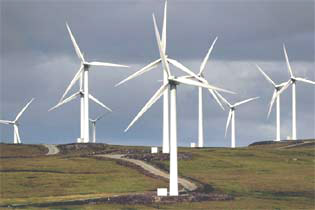
As told in a recent ad, a Johnsburg farmer who will host wind turbines now has many regrets.
He regrets having been the "lure" to draw in other unsuspecting landowners. He regrets that he has allowed fields to be subdivided, road base to be spread on land once picked bare of rocks, costly tiling to be cut up. He regrets that he's no longer the person who controls his own land and is now told where to go by security guards. He regrets the divide he has created between friends, between neighbors and between family members.
He regrets not having looked into all the ramifications first. That farmer is now locked in to a binding contract. But there are many landowners who have not yet suffered this fate.
Calumet County Citizens for Responsible Energy asks that landowners considering a contract first step back and study the issues. As with any financial transaction, don't put a lot of trust in those who stand to gain financially.
Look for Web sites and information from those experiencing the effects of this worldwide "gold" rush for wind power. People across world are rebelling. They're finding that they've lost control of their land and their lives. And they're in danger of financial hardship if these companies dissolve.
Our irresponsible government representatives are forcing this "windfall" for wind investors on us. Their knee-jerk reaction to the global climate change alarms will cause billions of dollars to be wasted, lives to be ruined, and environments degraded for what is, in actuality, a very inefficient energy source.
With a declining tax base and state and U.S. legislators driving us further into massive debt, taxpayer subsidies for wind will be impossible to maintain.
And with the subsidies gone, what will you be left hosting?
Don Bangert,
Chilton, Wisconsin

